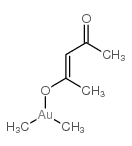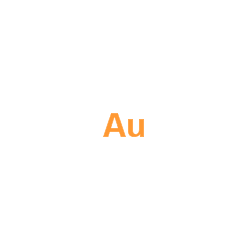Dimethyl(acetylacetonate)gold(III)(99.9%-Au)
Modify Date: 2024-01-07 10:44:13

Dimethyl(acetylacetonate)gold(III)(99.9%-Au) structure
|
Common Name | Dimethyl(acetylacetonate)gold(III)(99.9%-Au) | ||
|---|---|---|---|---|
| CAS Number | 14951-50-9 | Molecular Weight | 326.14300 | |
| Density | N/A | Boiling Point | 25ºC 0,01mm | |
| Molecular Formula | C7H13AuO2 | Melting Point | 81-82ºC | |
| MSDS | N/A | Flash Point | N/A | |
| Name | Dimethyl(acetylacetonate)gold(III), (99.9%-Au) |
|---|
| Boiling Point | 25ºC 0,01mm |
|---|---|
| Melting Point | 81-82ºC |
| Molecular Formula | C7H13AuO2 |
| Molecular Weight | 326.14300 |
| Exact Mass | 326.05800 |
| PSA | 26.30000 |
| LogP | 2.12520 |
|
Section 1: Product Identification Chemical Name:Dimethyl(acetylacetonate)gold (III), 98% (99.9%-Au) **MUST SHIP OVERNIGHT/DRY ICE** CAS Registry Number:14951-50-9 Formula:(CH3)2(C5H7O2)Au EINECS Number:None Chemical Family:metal alkyl Synonym:Dimethylgold (III) acetylacetonate; Dimethylgold (III) 2,5-pentanedionate
Section 2: Composition and Information on Ingredients IngredientCAS NumberPercentACGIH (TWA)OSHA (PEL) Title Compound14951-50-9100%no datano data Section 3: Hazards Identification May be irritating to skin, eyes, and respiratory tract. Exposure to gold compounds may damage kidney Emergency Overview: function and reduce blood cell count. Primary Routes of Exposure:Ingestion, inhalation, skin, eyes Eye Contact:May cause slight to mild irritation of the eyes. Skin Contact:May cause slight to mild irritation of the skin. Inhalation:Dust may be irritating to the nose, mucous membranes and respiratory tract. Ingestion may lead to dermatitis, dizziness, metallic taste, abdominal cramps, vomiting, bloody diarrhea, Ingestion: weakness, and convulsions. May cause irritation to the eyes, skin and respiratory tract, impairment of kidney and bone marrow function, Acute Health Affects: abdominal cramps, vomiting, bloody diarrhea, weakness, and convulsions. Chronic Health Affects:Prolonged exposure to gold compounds may lead to reduced red and white blood cell generation. NTP:No IARC:No OSHA:No SECTION 4: First Aid Measures Immediately flush the eyes with copious amounts of water for at least 10-15 minutes. A victim may need Eye Exposure: assistance in keeping their eye lids open. Get immediate medical attention. Wash the affected area with water. Remove contaminated clothes if necessary. Seek medical assistance if Skin Exposure: irritation persists. Remove the victim to fresh air. Closely monitor the victim for signs of respiratory problems, such as difficulty Inhalation: in breathing, coughing, wheezing, or pain. In such cases seek immediate medical assistance. Seek medical attention immediately. Keep the victim calm. Give the victim water (only if conscious). Induce Ingestion: vomiting only if directed by medical personnel. SECTION 5: Fire Fighting Measures Flash Point:not applicable Autoignition Temperature:none Explosion Limits:none Extinguishing Medium:none required If this product is involved in a fire, fire fighters should be equipped with a NIOSH approved positive pressure Special Fire Fighting Procedures: self- contained breathing apparatus and full protective clothing. Hazardous Combustion andIf involved in a fire this material may emit toxic fumes. Decomposion Products: Unusual Fire or Explosion Hazards: No unusual fire or explosion hazards. SECTION 6: Accidental Release Measures To avoid raising dust, small spills may be mixed with diatomaceous earth, sand, vermiculite, or other suitable Spill and Leak Procedures: inert material and swept up. SECTION 7: Handling and Storage Handling and Storage:Store under inert atmosphere in a tightly sealed container. Store cold. SECTION 8: Exposure Controls and Personal Protection Eye Protection:Always wear approved safety glasses when handling a chemical substance in the laboratory. Skin Protection:Wear protective clothing and gloves. Ventilation:Material may form a fine dust. Handle the material in an efficient fume hood. If ventilation is not available a respirator should be worn. The use of respirators requires a Respirator Respirator: Protection Program to be in compliance with 29 CFR 1910.134. Ventilation:Material may form a fine dust. Handle the material in an efficient fume hood. Additional Protection:No additional protection required. SECTION 9: Physical and Chemical Properties Color and Form:white to off-white xtl. Molecular Weight:326.6 Melting Point:81-82°C Boiling Point:subl. ~25°C/0.01mm Vapor Pressure:not applicable Specific Gravity:no data Odor:none Solubility in Water:insoluble SECTION 10: Stability and Reactivity Stability:(store cold) Hazardous Polymerization:no hazardous polymerization Conditions to Avoid:none Incompatibility:oxidizing agents and active metals Decomposition Products:carbon monoxide, carbon dioxide, and gold. SECTION 11: Toxicological Information RTECS Data:No information available in the RTECS files. Carcinogenic Effects:No data Mutagenic Effects:No data Tetratogenic Effects:No data SECTION 12: Ecological Information Ecological Information:No information available SECTION 13: Disposal Considerations Disposal:Dispose of according to local, state and federal regulations. SECTION 14: Transportation Shipping Name (CFR):Non-hazardous Hazard Class (CFR):NA Additional Hazard Class (CFR):NA Packaging Group (CFR):NA UN ID Number (CFR):NA Shipping Name (IATA):Non-hazardous Hazard Class (IATA):NA Additional Hazard Class (IATA):NA Packaging Group (IATA):NA UN ID Number (IATA):NA SECTION 15: Regulatory Information TSCA:Not listed in the TSCA inventory. SARA (Title 313):Title compound not listed. Second Ingredient:None SECTION 16 - ADDITIONAL INFORMATION N/A |
| Risk Phrases | 36/37/38 |
|---|---|
| Safety Phrases | 26-36/37/39 |
| HS Code | 2918300090 |
| Precursor 0 | |
|---|---|
| DownStream 1 | |
| HS Code | 2918300090 |
|---|---|
| Summary | 2918300090 other carboxylic acids with aldehyde or ketone function but without other oxygen function, their anhydrides, halides, peroxides, peroxyacids and their derivatives。Supervision conditions:None。VAT:17.0%。Tax rebate rate:9.0%。MFN tariff:6.5%。General tariff:30.0% |
 CAS#:7440-57-5
CAS#:7440-57-5